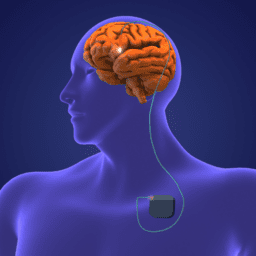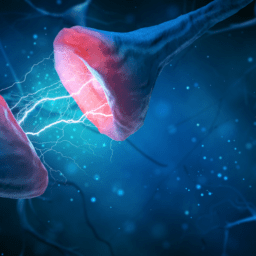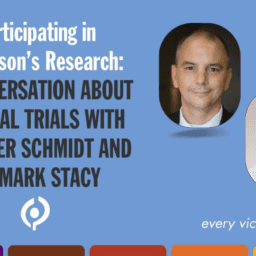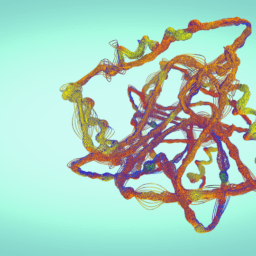This month’s What’s New in Parkinson’s post features stories about a new Parkinson’s-related genetic variant associated with African ancestry, exciting trial news about a new formulation of extended release levodopa and another GLP-1R agonist, multiple developments in research about DBS, a discussion of Nicotinamide Riboside, an overview of sex differences in neurological conditions, and much more!
PARKINSON’S SCIENCE AND RESEARCH NEWS
- A phase 3 trial of a new formulation of extended release carbidopa-levodopa has reported positive results. Compared to immediate release levodopa, the new formulation improved management of motor fluctuations while requiring fewer doses.
- Research presented in The Lancet reports discovery of a new genetic risk factor for Parkinson’s in people of African ancestry. The risk factor is a variant of in the GBA1 gene.
- More evidence for the efficacy of GLP-1R agonists in treating Parkinson’s: Preliminary results from the LixiPark study were presented at the annual Movement Disorder Society congress. Treatment with lixisenatide slowed progression of motor symptoms. Lixisenatide is a repurposed drug in the same class as exenatide, which is in a phase 3 trial in the UK.
- An overview of sex differences in neurological conditions includes a long section on Parkinson’s.
- A small study of people living with Parkinson’s in California found that people living with Parkinson’s tend to have a lower quality diet than people without Parkinson’s. Constipation and loss of sense of smell correlated with worse diets. Worse diets are those higher in carbohydrates, trans fats, and added sugar; higher quality diets are those with more fiber, protein, and healthy fat. The research found that people on high levels of dopamine agonists consumed more sugar than people on low doses of dopamine agonists.
- Brain structures associated with sense of smell and apathy are closely connected, and structural changes associated with apathy are seen in people with Parkinson’s who experience smell dysfunction.
- An article in Science Advances explores what is known about supplementation with nicotinamide riboside, which is currently being researched as a Parkinson’s therapy in a clinical trial in Norway.
- A study involving nearly 22,000 people found correlation between an inflammatory diet and increased risk of Parkinson’s.
- A study finds association between playing American football and increased rates of Parkinson’s; longer duration or participation is associated with greater risk.
- Allergic disease is associated with increased risk of Parkinson’s according to a large study of population data from South Korea.
- Living with Parkinson’s correlates with decreased walking speed. New research suggests that measuring walking speed over time may be helpful in monitoring Parkinson’s progression.
- A study published in Movement Disorders associates cognitive load with freezing and gait disturbance.
- New insights into neuroinflammation: Researchers in Alabama found that border-associated macrophages have greater influence than microglia on working against inflammation in the brain.
- Gait issues tend to be difficult to manage. In an experiment using a special dual-track treadmill that allows different speeds for each leg, researchers found that slowing the less affected leg’s side resulted in better normalization of gait than speeding the affected side.
- Falls are among the most significant risks for people with Parkinson’s. In an article that does not specifically address the Parkinson’s community, researchers study the perception of control on whether or not a person actually falls. The authors argue that perceptions of being in control protect against falling because feeling in control may work against an emotional response and subsequent loss of concentration in a moment when a person’s balance is challenged.
- An investigation of the use of AI to assess Parkinson’s severity reports interesting findings, including that current AI technology evaluates the finger tap component of the UPDRS evaluation nearly as well as specialist clinicians.
- More AI news: Researchers used stem cells and machine learning to identify whether cells derived from people with Parkinson’s were influenced by a genetic variant, by a distinct misfolding of proteins, or by exposure to pesticides.
- In preclinical animal models, a new treatment from Gain Therapeutics reduced Parkinson’s associated pathologies including aggregations of alpha-synuclein, increased dopamine production, and improved motor function.
- Researchers in npj report on presence of alpha-synuclein pathologies in the retina and optic nerve that can help distinguish and identify Parkinson’s and other neurological conditions.
- Gut journal presents a review of what is known about gastrointestinal syndromes preceding a Parkinson’s diagnosis.
- PINK1 and Parkin, two genes associated with Parkinson’s, influence calcium release in cells and may thereby contribute to Parkinson’s pathology.
PARKINSON’S TREATMENTS and THERAPIES
- An interesting overview from Parkinsonism and Related Disorders summarizes the findings of a study that correlated DBS surgery and weight gain. Parkinson’s is typically associated with weight loss, and weight loss is associated with increased mortality in people with Parkinson’s.
- Sometimes, DBS can induce dyskinesia that can be hard to treat. Researchers in Tremor Journal present a case study and consider ways to address this side effect of DBS treatment.
- In July, Boston Scientific received approval to begin using new imaging technology to improve and expedite DBS programming.
PARKINSON’S LIVING WELL STORIES
- A local news feature shares Joe Geniesse’s incorporation of exercise into his efforts to live well with Parkinson’s–and as a professional Santa Claus.
- Two movement disorder specialists discuss highlights from July’s World Parkinson’s Congress.
- AARP features stories about three people who are living well with Parkinson’s in different ways and in different parts of the United States.
- A news story highlights the Empowered Live! event in Kansas.
- A feature about a pilot study at Sacramento State University shares stories of people living well with Parkinson’s through exercise and engagement in research.
- Northeast Public Radio reports on Congressman Paul Tonko’s recent meeting with some constituents to talk about Parkinson’s legislation. Ambassador Kristi LaMonica is featured in the story.
PARKINSON’S SURVEYS, CLINICAL TRIALS, AND VOLUNTEER OPPORTUNITIES
- Inhibikase is recruiting participants for a phase 2 trial of a new c-Abl tyrosine kinase inhibitor. Inhibikase says in a press release that their research “has validated the critical role that c-Abl plays in the initiation and progression of Parkinson’s disease, as well as the potential of IkT-148009 as a promising new approach to disease modification.” This trial will also be among the first to utilize recently validated alpha-synuclein seed assay tests.
- The International Parkinson and Movement Disorders Society (MDS) is developing a new electronic diary (e-Diary), a digital solution for Parkinson’s. This e-Diary is intended to better characterize how the disease affects daily life. They are inviting people to participate in a survey intended to help aid the design of this new tool.
- A new trial studying Gemfibrozil, a drug that decreases fat production in the liver, is set for a phase two clinical trial in people with Parkinson’s. This trial will enroll people between 40 and 75 years and who have not begun taking medication for Parkinson’s.
- Aspen Neuroscience has been cleared by the FDA to develop a clinical trial for a new stem cell therapy. This trial will be the first multi-center study of its kind in the US, but the trial design and start date have not yet been announced.
- The Speech Accessibility Project (SAP) seeks volunteers for a research initiative aiming to make voice recognition technology more useful for people with a range of diverse speech patterns. More information is available here and here. To determine whether you are eligible to participate, visit the SAP registration page.
- A team of Dutch researchers created PregSpark: a registry for women with Parkinson’s who are pregnant or have recently given birth. The goal is to build an online, International Pregnancy and Parkinson’s Registry to prospectively and uniformly collect data on the course and outcome of as many as possible pregnancies in women with Parkinson’s disease. This data will help women with Parkinson’s make more informed decisions about pregnancy and improve the quality of care pregnant women with Parkinson’s receive. The PregSpark site is currently under construction but should be completed soon.
- Researchers in the UK are seeking survey responses about the usefulness of wearable technology to monitor medication effectiveness and adherence to dosing schedules.
- A phase 1b trial is recruiting volunteers for a study of a treatment that aims to influence inflammation.
- UK researcher and physician Tom Foltynie writes about ways to improve the structure of clinical trials for Parkinson’s.
- Biogen announces they’re discontinuing the LIGHTHOUSE trial. They note that the discontinuation results from evaluating the complexities and duration of the study and does not result from any safety or efficacy data. The LUMA study will continue, and participants in the LIGHTHOUSE study will be invited to participate.
- Researchers in Norway are investigating the efficacy of ambroxol in people with dementia with Lewy bodies.
- Researchers in the UK, in partnership with the Women’s Parkinson’s Project and MyMovesMatter, invite participation in a survey about the experience of menopause for women with Parkinson’s.
- Another study of ambroxol is launching. The DUPARG study is recruiting participants in Groningen, Netherlands.
- A new trial examining the possible neuroprotective effect of exercise has been listed by the University of Nevada.
- Researchers at Oregon Health and Sciences University are conducting a study to test whether a specific, dynamic exercise intervention can help prevent falls in people with Parkinson’s. This study uses safety equipment, including harnesses, to facilitate a regimen that involves turning while walking.
- University of Rochester Center for Health + Technology is undertaking a survey study to assess the ability of the Parkinson’s Disease-Health Index to measure patient-relevant changes in disease burden over the course of two years. Participants will complete surveys five times over two years and must be over 18, speak English, and have a self-reported or clinical diagnosis of Parkinson’s. More information is available here.
- Researchers at Columbia University’s Irving Medical Center are seeking participants for a study exploring the role of immune response in Parkinson’s. Participation is open to those with and without Parkinson’s and will involve donating blood, a questionnaire, a cognitive test, and a neurological examination. Click here to express interest in participating.
- Johns Hopkins University has announced a trial to evaluate whether levetiracetam can improve symptoms of Parkinson’s psychosis. The trial is not yet recruiting, but the plan is for it to begin by September. The trial design features a crossover assignment, which means every participant will receive an active trial drug for their participation.
- The LUMA trial continues to recruit participants. This trial aims to assess the safety and efficacy of BIIB122 tablets in slowing the progression of early-stage Parkinson’s. This study has sites in the US, China, France, Germany, the Netherlands, Poland, Spain, and the UK.
- The ACTIVATE trial is recruiting participants for a phase 2 trial of BIA 28-6156 in people with GBA mutations. This 78-week trial has site locations in the US, Canada, and Europe.
- In Colorado, a study the Foundation is funding continues to recruit participants. The study explores low-load resistance training with blood flow restriction to help develop exercise interventions for improved quality of life for people with advanced Parkinson’s.
- Washington University School of Medicine is sponsoring a study aiming to enroll participants with idiopathic REM sleep behavior disorder, as well as healthy controls, in preparation for a trial of neuroprotective treatments against synucleinopathies.
- Florida State University is sponsoring a study of speech articulation deficits in Parkinson’s.
- A study in South Carolina aims to identify brain biomarkers to predict the risk of cognitive change following DBS surgery.
- A survey for those in Ireland seeks to understand the influence of Parkinson’s symptoms and other factors on the quality of life of people with Parkinson’s.
- Another survey for those in Ireland seeks to understand how people access information about Parkinson’s.
- A trial sponsored by the University of Aberdeen in Scotland is recruiting participants for a study of the effects of constipation and changes in the microbiota in Parkinson’s.
- US-based company Neuronascent announces plans for a phase II trial of their neuro-restorative agent NNI-362. The agent is disease-agnostic, and a previous phase I trial for Alzheimer’s disease produced positive early-stage findings.
- Sinopia Biosciences announces they have secured funding for a clinical trial to explore the safety and efficacy of their novel agent in treating levodopa-induced dyskinesia.
- Staying Connected through Communication Study: The University of Washington SPEAC Lab invites individuals living with Parkinson’s to answer survey questions about their communication experiences. This is an online survey study that will take about 30-45 minutes. (Paper surveys are also available.) People with Parkinson’s and their family/friends/coworkers will complete SEPARATE surveys, and data are not shared between participants. This study is open to anyone in the US. Each participant will be mailed a $25 check upon survey completion.
- PreActive PD Study: This study, available for both English and Spanish speakers, implements an occupational-therapist-delivered physical activity behavior change coaching intervention in people with early-stage Parkinson’s. The study is based upon a recent single-arm cohort feasibility study (Pre-Activate PD/HD) that evaluated acceptability, implementation, and resulting effect estimates of the Pre-Activate PD intervention in 13 participants. The intervention provides one-on-one coaching sessions from an occupational therapist to individuals newly diagnosed with Parkinson’s. The individualized structured support in the sessions is aimed at facilitating and optimizing exercise uptake as part of an effective self-management program.
- Gamma Wave Trial: Sponsored by the Massachusetts Institute of Technology (MIT), this trial investigates the efficacy of a non-invasive method of neuromodulation called Gamma Entrainment Using Sensory Stimulation (GENUS) for managing Parkinson’s motor symptoms. GENUS is administered via light, sound, and tactile stimulation devices and has been tested on cognitively normal individuals and individuals with mild Alzheimer’s; the device was found to be safe for use and effective for entrainment in both populations.
- Deep Brain Stimulation (DBS) and Exercise Study at Barrow Neurological Institute: This study aims to help researchers learn more about how aerobic exercise affects symptoms of Parkinson’s and the quality of life in people who have DBS. They will also look at brain wave activity using the Medtronic Percept DBS device to better understand what changes in the brain might be caused by exercise and how that affects Parkinson’s symptoms. Phoenix-area residents reach out to Markey if interested.
- Colorado Oral Strengthening Device: The University of Colorado Denver is looking for adults with Parkinson’s to participate in a study exploring how a novel low-technology device can increase tongue strength comparable to standard-of-care exercise using tongue depressors but with the kinematics and simple biofeedback of existing high-cost devices. Research has shown that tongue resistance exercises paired with biofeedback results in improved tongue strength to support chewing, control of food and liquid in the mouth, and propulsion of material for a swallow.
- PD GENEration: The Parkinson’s Foundation announces a major expansion of its national study to make genetic testing and counseling more available for people with Parkinson’s. The study (NCT04057794) hopes to enroll 15,000 people in all 50 US states, Puerto Rico, and the Dominican Republic. For questions about enrollment, email genetics@parkinson.org. Know someone who speaks Spanish and wants to learn more and maybe participate in the study? Share this link.
- Parkinson’s Progression Markers Initiative: In an expanded study, the Parkinson’s Progression Markers Initiative (PPMI) is currently working to enroll up to 100,000 people with and without Parkinson’s. The study team is especially seeking to enroll people diagnosed with Parkinson’s in the past two years and who are not yet on treatment, as well as people 60 and older who aren’t living with Parkinson’s but have a risk factor for it (such as a close relative with Parkinson’s, a known Parkinson’s-associated mutation, and/or REM sleep behavior disorder). The observational study is also enrolling people with no known connection to Parkinson’s to serve as a control group.
- TOPAZ (Trial of Parkinson’s and Zoledronic Acid): Caroline Tanner, MD, PhD, is recruiting participants for a new remote clinical trial led by a team of Parkinson’s experts at UCSF in partnership with researchers from across the country. The study aims to help people with Parkinson’s or parkinsonism maintain their independence by reducing the risk of hip fractures. The study will test if zoledronate, an FDA-approved medication for osteoporosis, can prevent fractures in people with Parkinson’s–whether or not they have osteoporosis. To learn more, visit the study website at TOPAZstudy.org, email TOPAZ@ucsf.edu, or call (415) 317-5748.
- A PD Avengers research group is undertaking a new project called Sparks of Experience, designed to be more systematic about collecting and considering the experiences and ideas that come from the curious minds of people living with Parkinson’s. “In the past, these sometimes quirky ideas inspired by lived experience have turned into significant new directions for research. It could be said we are trying to capture serendipity,” the team says. To learn more and get involved, see the flyer here.
- Game-Based Exercise Project: Researchers at the University of Auckland are investigating how games can be used as potential rehabilitation systems. This project aims to develop suitable game-based exercise experiences to help people living with Parkinson’s. If you are 45 or older, living with a chronic condition such as Parkinson’s, and/or are experiencing age-related health conditions, you are invited to participate in a survey that will help the researchers to understand the community’s interest in games and gameplay in the context of exercise and rehabilitation. To learn more and take the 15-minute survey, see the flyer here.
- SPARX3 – A Phase 3 Clinical Trial about Exercise and Parkinson’s: This research team is currently seeking volunteers to participate in a clinical trial about the effects of aerobic exercise on people with Parkinson’s. Learn more and see if you qualify here. For more details, contact Katherine Balfany at SPARX3@ucdenver.edu.
- PAIRing Up: If you are a person with Parkinson’s or a care partner to someone with Parkinson’s, you are invited to participate in an online survey to address neuropsychiatric (cognition, depression, anxiety) concerns in Parkinson’s. The survey aims to learn about the needs and priorities for clinical care, education, support, and research related to neuropsychiatric symptoms. To learn more and participate, click here to download the flyer.
- The University of Oulu and collaborators from Aalborg University, Fraunhofer University, the University of Manchester, the University of Glasgow, the University of Lisbon, and the University of Melbourne are conducting a survey for people with Parkinson’s and Parkinson’s care partners about self-care. Complete the survey here to share your self-care strategies and techniques. You can also review ideas submitted by others and add them to your own self-care toolbox.
- Home-Based Exercise and Cognitive Behavior Therapy: University of Alabama in Huntsville
- Speech and Telemedicine Study: The Purdue Motor Speech Lab
- Parkinson’s and Service Dogs: University of Groningen, Netherlands
- Neurology Study Interest Registry: University of Rochester
For more of what’s new in Parkinson’s news, check out our full series here.
WANT MORE PRACTICAL ARTICLES LIKE THIS?
You can learn much more about living well with Parkinson’s today through our Every Victory Counts® suite of resources. Each manual is packed with up-to-date information about everything Parkinson’s. Click the link below to order your manual(s).

















